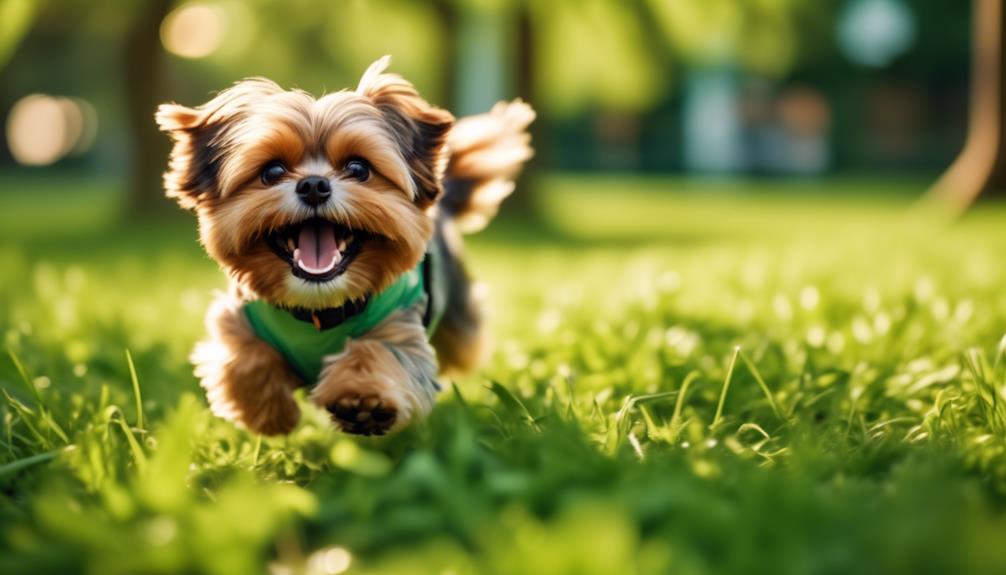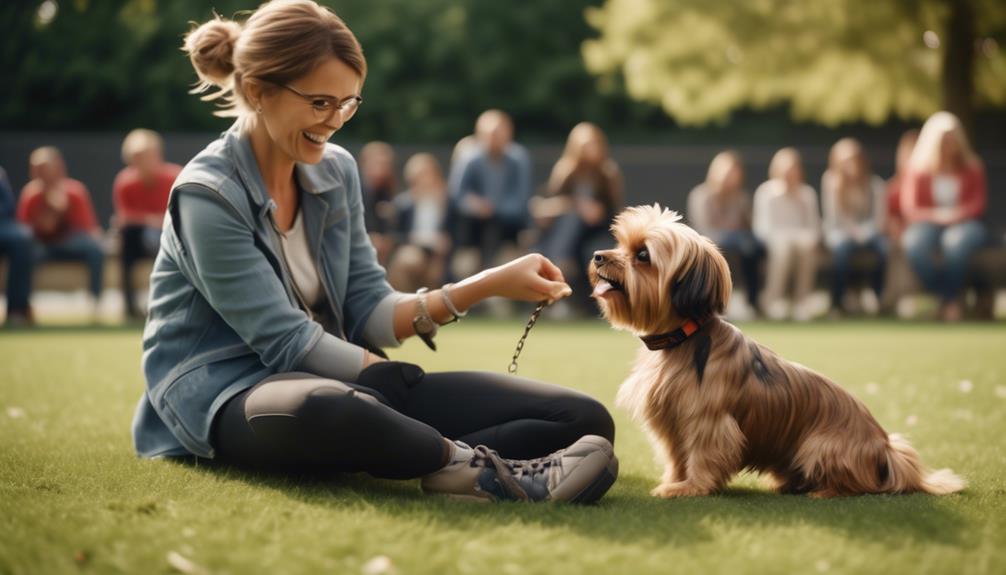
Did you know that the Shorkie dog breed is a cross between a Shih Tzu and a Yorkshire Terrier? This unique combination results in a charming companion that possesses a delightful blend of traits from both parent breeds.
If you’re curious to learn more about these adorable pups and what makes them so special, keep reading. From their size and appearance to their temperament and care requirements, we’ll uncover all the fascinating information and characteristics that make Shorkies a popular choice among dog lovers.
Discover the perfect furry addition to your family and find out why Shorkies are truly one-of-a-kind.
Key Takeaways
- Shorkies are a small dog breed, typically measuring 6-12 inches tall and weighing 5-15 pounds.
- They have a long, silky, double coat that comes in various colors such as black, white, brown, and tan.
- Shorkies are known for their affectionate, playful, energetic, and alert temperament.
- When choosing a dog for an apartment, size alone should not be the only consideration, and it’s important to prioritize qualities such as being quiet, low-energy, and displaying good manners towards other residents.
Origin and History
The Shorkie dog breed has a fascinating origin and history that traces back to the United States. These adorable dogs are a cross between the Shih Tzu and the Yorkshire Terrier, resulting in a unique and lovable hybrid.
The purpose of breeding Shorkies was to create a small companion dog with a friendly and affectionate nature. The breed gained popularity in the early 2000s and has since become a beloved choice for many dog lovers.
Shorkies are known for their playful and energetic personalities, making them a joy to be around. They also have a hypoallergenic coat that requires regular grooming to keep it looking its best.
Despite their small size, Shorkies have a big heart and are sure to bring happiness to any home they become a part of.
See another Dog breed profile.
Siberian Husky Dog Breed
Size and Weight

After learning about the fascinating origin and history of the Shorkie dog breed, it’s time to delve into an important aspect of their characteristics – their size and weight.
Here are four key points about the size and weight of Shorkies that will surely captivate you:
- Compact and Small: Shorkies are a small breed, typically measuring between 6 to 12 inches tall. Their petite size adds to their cuteness and makes them perfect for cuddling in your arms.
- Lightweight Companions: With an average weight ranging from 5 to 15 pounds, Shorkies are lightweight and easy to carry around. They won’t strain your arms during walks or adventures together.
- Perfect for Any Space: Due to their small size and weight, Shorkies are ideal for apartment living. Whether you have a cozy studio or a small apartment, they can adapt well to limited spaces without feeling cramped.
- Travel Buddies: Their compact size and light weight make Shorkies excellent travel companions. Whether you’re going on a road trip or hopping on a plane, they can easily fit in carriers and accompany you on your adventures.
With their small stature and lightness, Shorkies aren’t only adorable but also incredibly convenient for any owner.
Lifespan and Health

When considering the lifespan and health of Shorkies, it’s important to understand their average life expectancy and potential health concerns.
Shorkies have a relatively long lifespan, typically living between 12 to 15 years. However, like all dogs, they can be prone to certain health issues.
One common health concern for Shorkies is dental problems, such as tooth decay and gum disease. It’s essential to maintain good oral hygiene by regularly brushing their teeth and providing dental treats.
Shorkies may also be susceptible to respiratory problems, allergies, and eye infections. Regular vet check-ups and a balanced diet can help prevent or manage these issues.
Additionally, Shorkies can be prone to obesity, so it’s important to provide them with regular exercise and a healthy diet to maintain their overall health and well-being.
Coat Color and Texture

Shorkies come in a variety of coat colors and textures, adding to their unique and adorable appearance. Here are four reasons why their coat color and texture will melt your heart:
- Endless color possibilities: From sleek black to fluffy white, Shorkies can have a coat color that matches your personal style and preference. Their coats can also come in shades of brown and tan, creating a beautiful and diverse range of options.
- Soft and silky texture: The texture of a Shorkie’s coat is incredibly soft and silky to the touch. Running your fingers through their luxurious fur will give you a sensory delight that you won’t be able to resist.
- Hypoallergenic qualities: Shorkies are known for having hypoallergenic coats, making them a great choice for people with allergies. Their low-shedding coats minimize the amount of allergens in your home, allowing you to enjoy the company of a furry friend without the hassle.
- Eye-catching patterns: Shorkies can also have unique coat patterns, such as spots or patches, that make them stand out even more. These eye-catching patterns add another layer of charm to their already adorable appearance.
Temperament and Personality

One of the key factors to consider when choosing a Shorkie as a pet is their temperament and personality. Shorkies are known for being affectionate, playful, energetic, and alert. They are very loving towards their family and are suitable for novice owners. Shorkies have a low sensitivity level and can tolerate being alone. They can also adapt well to different weather conditions, whether it’s hot or cold. However, it’s important to note that Shorkies have a tendency to bark or howl, and they may have some predatory instincts and wanderlust potential. They require regular exercise and love to play. Overall, Shorkies are friendly and fun-loving companions that can bring joy to any home.
| Temperament | Personality |
|---|---|
| Affectionate | Playful |
| Energetic | Alert |
| Loving towards family | Suitable for novice owners |
| Low sensitivity level | Can tolerate being alone |
| Adapts well to different weather conditions | Tendency to bark or howl, may have predatory instincts and wanderlust potential |
Adaptability to Apartment Living

If you live in an apartment and are considering getting a Shorkie, it’s important to understand their adaptability to apartment living. Here are four key factors to consider:
- Size alone shouldn’t be the sole determinant when choosing a dog for an apartment. It’s essential to prioritize qualities such as being quiet, low-energy, calm indoors, and exhibiting good manners.
- Small dogs with high energy levels may not be suitable for apartment living. However, certain small dog breeds with higher energy levels can still thrive in apartments if their exercise needs are met.
- Adapting well to apartment living isn’t restricted to small breeds. Some larger breeds can also adjust well to apartment living as long as their activity levels are lower.
- When selecting a dog for an apartment, it’s crucial to consider the comfort of your neighbors. Desirable qualities in an apartment dog include being quiet and displaying polite behavior towards other residents.
Understanding these factors will help you make an informed decision and ensure a harmonious living environment for both you and your Shorkie.
Choosing the Right Dog for Your Apartment

When considering the best dog breed for your apartment, it’s important to factor in their adaptability and prioritize qualities that promote a harmonious living environment for both you and your furry companion. Size alone shouldn’t be the sole determinant when choosing a dog for an apartment.
While small dogs are often considered ideal, it’s also crucial to consider your neighbors’ comfort. Desirable qualities in an apartment dog include being quiet, low-energy, and displaying polite behavior towards other residents. Small dogs with high energy levels may not be suitable for apartment living, but some larger breeds can adapt well to apartment living with lower activity levels.
Certain small dog breeds with higher energy levels can still thrive in apartments, so prioritize qualities such as being quiet, low-energy, calm indoors, and exhibiting good manners.
All-around Friendliness and Compatibility

The Shorkie dog breed is known for its all-around friendliness and compatibility with families and novice owners alike. Here are four reasons why the Shorkie makes a great companion:
- Unconditional Love: The Shorkie is incredibly affectionate with its family, showering them with love and devotion. Their friendly nature ensures a warm and welcoming presence in your home.
- Easy to Handle: Novice owners will appreciate the Shorkie’s adaptability and easygoing nature. They’re quick to learn and eager to please, making training a breeze.
- Low Sensitivity Level: Shorkies have a laid-back attitude, making them tolerant of different situations and environments. They can handle being alone for short periods and adapt well to changes in routine.
- Weather-Resistant: Whether it’s playing in the snow or basking in the sun, Shorkies are comfortable in both hot and cold weather. So, no matter the season, they can be your constant companion.
With their friendly and adaptable nature, Shorkies are the perfect addition to any family or home.
Suitability for Novice Owners

Novice owners will find the Shorkie dog breed to be a perfect match for their lifestyle and needs.
Shorkies are known for being good for novice owners due to their friendly and affectionate nature. They’re low in sensitivity and can tolerate being alone.
Additionally, Shorkies are adaptable to both cold and hot weather conditions. When it comes to grooming, Shorkies have a long, silky coat that requires regular brushing and occasional professional grooming.
They’re small in size, making them suitable for apartment living. Shorkies have moderate exercise needs and are playful and energetic.
Novice owners should ensure that they provide the necessary mental and physical stimulation for their Shorkie to thrive.
Sensitivity Level and Independence

If you’re considering a Shorkie as a pet, you’ll be pleased to know that they’ve a low sensitivity level and can be quite independent.
Here are four reasons why this is beneficial for you:
- Less emotional sensitivity means they’re less likely to get easily upset or anxious, making them easier to handle and train.
- Their independence allows them to entertain themselves and not rely solely on your attention, giving you more freedom and flexibility in your daily routine.
- They’re less clingy and more self-reliant, which can prevent separation anxiety and make them more adaptable to different environments.
- Their low sensitivity level makes them less prone to being affected by loud noises or sudden changes, ensuring a more peaceful and harmonious living environment.
With their low sensitivity level and independence, Shorkies can be a great choice for individuals or families looking for a low-maintenance and resilient companion.
Behavioral Considerations and Training Needs

When considering the behavioral considerations and training needs of a Shorkie, it is important to understand their natural instincts and exercise requirements. Shorkies have a tendency to bark or howl, which may require training to manage. They also have a wanderlust potential, so it’s crucial to keep them on a leash or within a secure area. In terms of exercise, Shorkies are energetic and playful, requiring daily physical activity to keep them happy and healthy. This can include walks, playtime, and interactive toys. To further understand their needs, refer to the table below:
| Behavior Considerations and Training Needs |
|---|
| – Tendency to bark or howl |
| – Wanderlust potential |
| – Exercise requirements |
| – Playfulness and intensity |
Predatory Instincts and Safety Measures

To ensure the safety of your Shorkie and manage their predatory instincts, it’s important to implement effective safety measures. Here are four crucial steps you can take to keep your furry friend safe:
- Secure your yard: Install a sturdy fence around your yard to prevent your Shorkie from wandering off or getting into dangerous situations. Ensure that the fence is tall enough to prevent them from jumping over and that there are no gaps for them to squeeze through.
- Supervise outdoor activities: Keep a close eye on your Shorkie when they’re outside, especially in areas with wildlife or busy roads. Predatory instincts may kick in, and they may chase after small animals or dart into traffic. Always keep them on a leash or in a secure, enclosed area.
- Socialize and train: Proper socialization and training can help curb predatory behaviors. Expose your Shorkie to different environments, people, and animals from a young age. Enroll them in obedience classes to teach them commands and improve their impulse control.
- Use interactive toys: Provide your Shorkie with plenty of mental and physical stimulation by using interactive toys. Puzzle toys or treat-dispensing toys can redirect their predatory instincts and keep them entertained.
Exercise Requirements and Playfulness

Exercise is an essential aspect of keeping a Shorkie happy and healthy. Despite their small size, Shorkies have moderate exercise needs and are quite playful. They enjoy interactive playtime with their owners and benefit from daily walks to stimulate their minds and bodies. Engaging in regular exercise helps prevent obesity and promotes overall well-being. However, it is important to note that Shorkies may have limitations due to their size and energy levels. They may not require as much exercise as larger breeds, but they still need opportunities to burn off energy. A 20-30 minute walk each day and some playtime indoors or in a secure yard can suffice.
| Exercise Requirements | Playfulness |
|---|---|
| Moderate exercise needs | Energetic and playful |
| Daily walks and interactive playtime | Loves to engage in games and activities |
| 20-30 minute walk each day | Requires mental and physical stimulation |
Meeting their exercise requirements and providing outlets for playfulness will ensure that your Shorkie remains happy, healthy, and well-balanced.
Shorkie Specific Information and Care Tips

For optimal care and understanding of your Shorkie, it’s important to be aware of their specific information and helpful care tips. Here are some key points to consider:
- Regular grooming: Due to their long, silky coat, Shorkies require regular brushing to prevent matting and tangling. This not only keeps them looking their best but also helps maintain their overall health and hygiene.
- Dental care: Shorkies are prone to dental issues, so it’s vital to establish a regular dental care routine. This includes brushing their teeth regularly and providing dental treats or toys to promote good oral health.
- Socialization: Shorkies are social dogs and thrive on interaction with their owners and other animals. Regular socialization from a young age helps them develop good behavior and ensures they feel comfortable in various situations.
- Balanced diet: Providing a well-balanced diet that meets their nutritional needs is crucial for the overall health and well-being of Shorkies. Consult with your veterinarian to determine the appropriate diet and portion sizes for your furry friend.
Frequently Asked Questions
Are Shorkies Hypoallergenic?
Yes, shorkies are hypoallergenic. Their coat is made of hair, not fur, which reduces the amount of allergens they produce. However, individual reactions may vary, so it’s always best to spend time with a shorkie before bringing one home.
Do Shorkies Shed a Lot?
Yes, they do shed, but not a lot. Shorkies have a low to moderate shedding level due to their long, silky double coat. Regular grooming and brushing can help minimize shedding and keep their coat looking healthy.
Can Shorkies Be Left Alone for Long Periods of Time?
Yes, shorkies can be left alone for long periods of time, but it’s important to provide them with mental stimulation and exercise before leaving. Make sure to gradually increase the time alone to avoid separation anxiety.
Are Shorkies Good With Children?
Yes, Shorkies are generally good with children. They are affectionate and friendly, making them great companions for kids. However, it’s important to supervise their interactions to ensure safety and teach children how to properly handle and respect the dog.
Do Shorkies Require a Lot of Exercise?
No, Shorkies don’t require a lot of exercise. They are small dogs with low energy levels, making them suitable for apartment living. However, regular walks and playtime are still important to keep them healthy and happy.
Conclusion
In conclusion, the Shorkie dog breed is a wonderful choice for those looking for a furry friend. Their adaptability to apartment living, friendly and affectionate nature, and ability to tolerate being alone make them a great companion.
With their small size, beautiful coats, and playful personalities, Shorkies bring joy and love to any home.
Remember to provide proper care, training, and exercise to ensure a happy and healthy life for your Shorkie.




